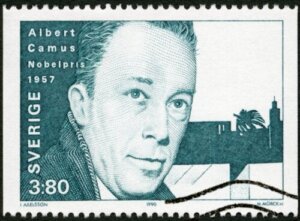Learn what Albert Camus Had to Say about the Meaning of Life


Written and verified by the philosopher Maria Alejandra Morgado Cusati
What is the meaning of life? Are we alive for some reason or objective? Why do we exist? These are questions that human beings have asked themselves since the beginning and have tried to answer through philosophy, science, and religion.
The truth is that we don’t have a definitive answer to these questions. Some, for example, give meaning to their lives by believing in deities; others find some meaning in science; while many others simply deny that there’s any explanation for our existence that transcends our understanding.
In this regard, Albert Camus, one of the most influential contemporary philosophers in history, argued that life has no meaning. But for him, this doesn’t imply that life is not worth living. On the contrary, the lack of meaning is what allows us to be masters and builders of our existence. Let’s take a closer look.
The absurdism of Albert Camus
Albert Camus was born in 1913 in Mondowi (French Algeria). Along with Jean-Paul Sartre, he’s considered one of the most important figures of 20th-century French literature.
In 1957, at the age of 44, he won the Nobel Prize for Literature, making him the second youngest person to be awarded this prize.
According to this great thinker, it’s useless for human beings to try to find the meaning of life, because there’s no meaning at all.
In other words, life is an insignificant experience that can be summed up as a succession of useless, empty, and meaningless events, which we repeat every day out of inertia, habit, or tradition. However, human beings have always looked for a reason behind any event or idea.
We can’t stand things happening just because they do. Everything must have a cause or a reason that justifies it.
However, according to Camus’ philosophy, this solution is not possible, and the lack of an original cause produces inevitable meaninglessness, or what amounts to the same thing: absurdity.
The human mind doesn’t accept a lack of justification, and, consequently, absurdity arises.
In other words, human beings fall into absurdity when we try to make something insignificant into a work that transcends us. However, it’s precisely the acceptance of the absurd that leads human beings to live with freedom.
The absurd is born of the confrontation between the human appeal and the unreasonable silence of the world. This iswhat must not be forgotten. This is what we must hold on to, because the whole consequence of a life can be born from it. -Albert Camus in The Myth of Sisyphus, 1942

Ways of facing the absence of meaning in life
For Camus, there are three ways of facing the absurdity of life, and only the last one is the right one:
- The first is to surrender to absurdity, opting to end one’s own life. In this case, the person understands that there’s no higher meaning to his life and comes to an accelerated conclusion: “life is not worth living.” This implies accepting that life has surpassed us, that we can’t explain it.
- The second is to deny the absurdity, surrendering ourselves to a faith that gives us wrong answers about the meaning of life. In this case, gods and dogmas appear as the most common answers to uncertainty.
- And the third option – which for Camus is the right way – would be to accept the absurd and rebel against it. This implies understanding that the meaninglessness of life doesn’tmean that it’s not worthwhile. On the contrary, it’s about renouncing the search for an explanation and living with independence, freedom, and self-determination.
From the absurd, I have obtained three consequences: my rebellion, my freedom, and my passion. By the mere play of conscience I transform into a rule of life what was an invitation to death. -Albert Camus in The Myth of Sisyphus
We think you may also enjoy reading this article: The Similarities and Differences between Philosophy and Psychology
Finding meaning is existence itself
Albert Camus also writes the following:
I still believe that this world has no higher meaning. But I also know that in this world something has meaning and that something is man, because he is the only being who demands to have meaning.
-Letters to a German Friend (1944
With this sentence, the French philosopher makes it clear that the meaning of human existence is existence itself. The pretension of the human being to seek an explanation of life gives the species a unique value that, for Camus, is the bastion of a universal reason.

Like this article? You may also like to read: What is Aesthetics in Philosophy and What Does it Study?
Owners of our lives
Camus’ absurdism takes away from philosophy the task of answering questions such as “what is the meaning of life” or “why do we exist.” As the author argues, life is an absurdity that has no meaning, and the universe is indifferent to the existential doubts of human beings.
However, this doesn’t have to be a negative thing. It’s precisely the lack of meaning that allows us to live with such freedom and self-determination.
In other words, it’s we who determine the meaning of our individual existence by proposing personal goals and objectives. In short, we are the masters of our own lives.
All cited sources were thoroughly reviewed by our team to ensure their quality, reliability, currency, and validity. The bibliography of this article was considered reliable and of academic or scientific accuracy.
- Camus A. El extranjero. México: Selector; 2021.
- Camus A. El mito de Sísifo. España: Penguin Random House; 2021.
- Málishev M. Albert Camus: de la conciencia de lo absurdo a la rebelión. Ciencia Ergo Sum [Internet]. 2000 [consultado el 25 de julio de 2022]; 7(3): 235-245. Disponible en: https://www.redalyc.org/pdf/104/10401904.pdf
This text is provided for informational purposes only and does not replace consultation with a professional. If in doubt, consult your specialist.








